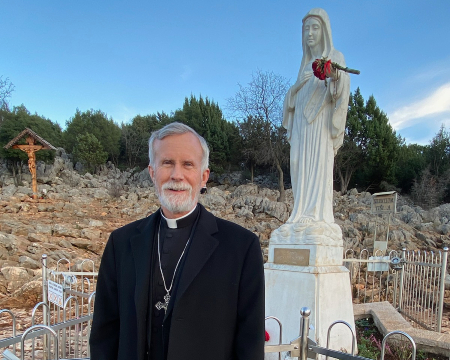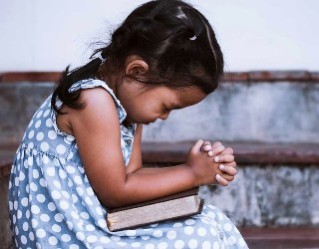We ask you, humbly: don't scroll away.
Hi readers, it seems you use Catholic Online a lot; that's great! It's a little awkward to ask, but we need your help. If you have already donated, we sincerely thank you. We're not salespeople, but we depend on donations averaging $14.76 and fewer than 1% of readers give. If you donate just $5.00, the price of your coffee, Catholic Online School could keep thriving. Thank you.Help Now >
Room for Religion in Diplomacy
FREE Catholic Classes
Faith's Role in International Affairs
NEW YORK, FEB. 28, 2004 (Zenit) - Events in recent years brought home, often brutally, the influence of religion in international affairs. Conflicts such as the internecine strife in Balkans and the attacks of Sept. 11, 2001, have also prompted scholars to intensify their analysis of religion's impact on politics.
Religion is not only a factor that provokes violence; it can also be an important part in promoting peace. This is an underlying idea in a collection of essays edited by Douglas Johnston and published last year under the title "Faith-Based Diplomacy: Trumping Realpolitik."
The introduction observes that religion stands at the center of much of the conflict in the world today, and that its importance might increase because of globalization's threat to traditional values. Consequently, religion should be given "its just due as a defining element of national security."
One of the essays, by Johnston and Brian Cox, notes that this directly contradicts the secularization thesis, expounded by the founder of sociology, Auguste Comte. The 18th-century philosopher had argued that modernization and progress would lead to a weakening of religion.
To contrast the disparity between a secular and faith-based way of acting, Johnston and Cox turn to outline how diplomacy differs when carried out by religiously motivated people. Such faith-based diplomacy has among its characteristics:
We ask you, humbly: don't scroll away.
Hi readers, it seems you use Catholic Online a lot; that's great! It's a little awkward to ask, but we need your help. If you have already donated, we sincerely thank you. We're not salespeople, but we depend on donations averaging $14.76 and fewer than 1% of readers give. If you donate just $5.00, the price of your coffee, Catholic Online School could keep thriving. Thank you.Help Now >
-- A conscious dependency on spiritual principles and resources in the conduct of peacemaking. This can include prayer, fasting and forgiveness.
-- A reliance on a certain spiritual authority. Intermediaries need a certain legitimacy, based either on ties to an institution or through trust based on a personal spiritual charisma.
-- A firm rooting in a particular religious tradition. Nevertheless, a faith-based diplomat should understand and respect the essence of other traditions.
-- A transcendent approach to conflict resolution that adds to the human logic present in normal diplomacy. This approach would rely on sacred texts that informs about human nature and the spiritual dimension of experience.
-- The ability to persevere against overwhelming odds.
Faith-based diplomacy, they continue, can be carried out in diverse ways. It can bring a new perspective to old problems. It can work to build bridges between conflicting parties. Other modes involve efforts to facilitate mediation and working to heal the wounds of history.
Mixed record in ex-Yugoslavia
In his essay on Bosnia-Herzegovina and Kosovo, David Steele points to a positive and a negative role played by religion. He noted the extraordinary examples of interfaith efforts at reconciliation among the religious communities in these zones. For example, the leaders of the Serbian Orthodox, Catholic, Muslim and Jewish communities in Bosnia signed a statement of shared moral commitment and established a new interreligious council in 1997. Three years later, Kosovo's religious leaders also formed an interreligious council and published a statement condemning violence and intolerance.
These postwar acts were an important change, as some religious leaders in the recent past had condoned war and ethnic division. In fact, noted Steele, religion in the former Yugoslavia had been used too often to deepen social and ethnic cleavages.
Steele, who restricted his analysis to the part played by Orthodox and Catholic churches in the conflicts, commented that religion had long been the single most important defining factor for Serbs, Croats and other peoples. This had led to a tendency to sacralize nationality, which in turn contributed to intolerance. During the conflicts some of the clergy in the churches were led by nationalistic sentiments and played a role in fomenting conflicts.
Others, however, were involved in efforts of reconciliation and humanitarian aid. Steele observed that a common characteristic of these Christian leaders was the ability to find a balance between justice and reconciliation. In this way they were able to condemn the injustices committed while at the same time reaching out to the other side.
In the book's concluding essay R. Scott Appleby acknowledges religion's capacity to provoke violence. Whether it be Christianity or Islam, Hindu nationalists in India or Buddhist agitators in Sri Lanka, combatants often claim religion as their motivation. But religion also provides important motivations for peacemaking, Appleby says. One of the tasks facing contemporary society, he continues, is to identify and cultivate in each distinctive religious tradition those strengths that will aid in building peace.
Limits of sovereignty
"The Sacred and the Sovereign: Religion and International Politics" is another collection of essays, also published last year, that argues in favor of recognizing the religious dimension in international affairs. Edited by John Carlson and Erik Owens, the work touches on topics ranging from sovereignty to human rights to the just war.
The introduction observes that in Western culture the medieval period saw religion unifying politics under the authority of God. While emperors and popes presided over separate realms, both acted as regents of God's sovereignty. This model was rejected in the period following the religious wars of the 17th century, when religion was rejected as a divisive and destructive force and political authority was grounded in the secular state.
In recent times this system is being challenged. The authority of the sovereign state is being challenged from above by international organizations, while from below globalization is allowing people and groups to form strong transnational communities based on religious, cultural and ideological grounds.
In her essay, Susanne Hoeber Rudolph examines what the fading of the sovereign state implies for religion. She noted that some attempts have been made to formulate some kind of universal religiosity or moral code. As well, with increased migration leading to a greater mix of religions in many countries, an increased emphasis has been placed on ecumenism. Yet, she thinks it unlikely that the new transnationalism will favor the creation of a universal church.
Paul Griffiths argues, nonetheless, that religious allegiances have important implications for state sovereignty. We need to find, he explains, alternatives to views that either turn God into a servant of the state or transform the state into God's hand here on earth.
In his essay, J. Bryan Hehir, at the time of writing head of Catholic Charities USA, addressed the matter of just war ethics. In the decades after World War II, while ethical reflection was lively over themes such as human rights and nuclear weapons, the religious perspective was often sidelined, even if some of the ideas used in the debate originated in religious thought.
With the end of the Cold War the 1990s saw a renewal of interest in the role of religious ideas and institutions in debates over the use of state power. Father Hehir argued that an analysis based on just-war criteria will help affront current problems in international politics, such as humanitarian military intervention and dealing with terrorism.
For his part John Carlson points to the need for a more theological perspective on international issues. Taking into account the sanctity of human dignity that undergirds human rights provides a much-needed addition to a merely Kantian-inspired vision of justice. In developing a system of international justice to deal with questions of human rights, Carlson argues for adopting an underlying anthropological concept of the person as an image of God.
Opinions differ widely on how to integrate a religious vision into international politics. That religion has a role at all, seems certain.
Contact
Catholic Online
https://www.catholic.org
CA, US
Catholic Online - Publisher, 661 869-1000
info@yourcatholicvoice.org
Keywords
Faith, Affairs, International
More Catholic PRWire
Showing 1 - 50 of 4,716
A Recession Antidote
Randy Hain
Monaco & The Vatican: Monaco's Grace Kelly Exhibit to Rome--A Review of Monegasque-Holy See Diplomatic History
Dna. Maria St. Catherine Sharpe, t.o.s.m., T.O.SS.T.
The Why of Jesus' Death: A Pauline Perspective
Jerom Paul
A Royal Betrayal: Catholic Monaco Liberalizes Abortion
Dna. Maria St.Catherine De Grace Sharpe, t.o.s.m., T.O.SS.T.
Embrace every moment as sacred time
Mary Regina Morrell
My Dad
JoMarie Grinkiewicz
Letting go is simple wisdom with divine potential
Mary Regina Morrell
Father Lombardi's Address on Catholic Media
Catholic Online
Pope's Words to Pontifical Latin American College
Catholic Online
Prelate: Genetics Needs a Conscience
Catholic Online
State Aid for Catholic Schools: Help or Hindrance?
Catholic Online
Scorsese Planning Movie on Japanese Martyrs
Catholic Online
2 Nuns Kidnapped in Kenya Set Free
Catholic Online
Holy See-Israel Negotiation Moves Forward
Catholic Online
Franchising to Evangelize
Catholic Online
Catholics Decry Anti-Christianity in Israel
Catholic Online
Pope and Gordon Brown Meet About Development Aid
Catholic Online
Pontiff Backs Latin America's Continental Mission
Catholic Online
Cardinal Warns Against Anti-Catholic Education
Catholic Online
Full Circle
Robert Gieb
Three words to a deeper faith
Paul Sposite
Relections for Lent 2009
chris anthony
Wisdom lies beyond the surface of life
Mary Regina Morrell
World Food Program Director on Lent
Catholic Online
Moral Clarity
DAN SHEA
Pope's Lenten Message for 2009
Catholic Online
A Prayer for Monaco: Remembering the Faith Legacy of Prince Rainier III & Princess Grace and Contemplating the Moral Challenges of Prince Albert II
Dna. Maria St. Catherine Sharpe
Keeping a Lid on Permissiveness
Sally Connolly
Glimpse of Me
Sarah Reinhard
The 3 stages of life
Michele Szekely
Sex and the Married Woman
Cheryl Dickow
A Catholic Woman Returns to the Church
Cheryl Dickow
Modernity & Morality
Dan Shea
Just a Minute
Sarah Reinhard
Catholic identity ... triumphant reemergence!
Hugh McNichol
Edging God Out
Paul Sposite
Burying a St. Joseph Statue
Cheryl Dickow
George Bush Speaks on Papal Visit
Catholic Online
Sometimes moving forward means moving the canoe
Mary Regina Morrell
Action Changes Things: Teaching our Kids about Community Service
Lisa Hendey
Easter... A Way of Life
Paul Spoisite
Papal initiative...peace and harmony!
Hugh McNichol
Proclaim the mysteries of the Resurrection!
Hugh McNichol
Jerusalem Patriarch's Easter Message
Catholic Online
Good Friday Sermon of Father Cantalamessa
Catholic Online
Papal Address at the End of the Way of the Cross
Catholic Online
Cardinal Zen's Meditations for Via Crucis
Catholic Online
Interview With Vatican Aide on Jewish-Catholic Relations
Catholic Online
Pope Benedict XVI On the Easter Triduum
Catholic Online
Holy Saturday...anticipation!
Hugh McNichol












 Daily Readings for Saturday, April 20, 2024
Daily Readings for Saturday, April 20, 2024 St. Marian: Saint of the Day for Saturday, April 20, 2024
St. Marian: Saint of the Day for Saturday, April 20, 2024 Children's Prayer For Parents: Prayer of the Day for Saturday, April 20, 2024
Children's Prayer For Parents: Prayer of the Day for Saturday, April 20, 2024

